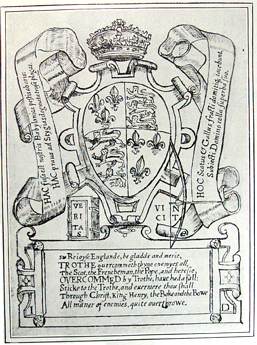Her education
Elizabeth received a broad, humanist education under the tutelage of Cambridge scholars, John Cheke (Edward VI's tutor) and Roger Ascham. She became proficient in French, Italian, Latin, and Greek*.
Elizabeth's love of literature, music, drama and dancing stayed with her until her death, and she left behind several poems* as well as translations of Greek and Latin works (such as Boethius's The Consolation of Philosophy). Most of the plays Shakespeare wrote in her lifetime were acted before her, and there is a long tradition that Shakespeare wrote The Merry Wives of Windsor at her request*.
"A masculine power of application"
Visitors to the court remarked upon her sharp intellect and lively wit, seeing her as a hopeful prospect for the throne. Ascham boasted of his pupil's excellence (though his highest compliment is that she thinks almost like a man):
. . .so much solidity of understanding, such courtesy united with dignity, have never been observed at so early an age. She has the most ardent love of true religion and of the best kind of literature. The constitution of her mind is exempt from female weakness, and she is endued with a masculine power of application.
(From a letter to John Sturmius, 1550, quoted in Mumby, Girlhood, 69-72.)
Ascham also praised Elizabeth for her preference of plain attire over customary female adornments, likening her to Hippolyta, the Amazon Queen of Greek legend who was loved by Theseus*. She purposefully cultivated an image of studiousness and piety in order to live down the effects of the earlier scandal with Thomas Seymour.
Selected Poems (Representative Poetry, Toronto). Selected Works of Queen Elizabeth (Luminarium).
Footnotes
-
Elizabeth the scholar
Roger Ascham wrote of her abilities: "Yea, I believe, that beside her perfect readiness in Latin, Italian, French, and Spanish, she readeth here now at Windsor more Greek every day than some prebendary of this church doth read Latin in a whole week."
(from The Schoolmaster)
-
Elizabeth the poet
As might be expected, defiance of Fortune was a favourite theme in Elizabeth's writing:
On Fortune
Never think you fortune can bear the sway
Where virtue's force can cause her to obey.The lines written on her window at the Bedingfield estate are more enigmatic:
Much suspected by me,
Nothing proved can be,
Quoth Elizabeth prisoner.(Both poems are found in The Poems of Queen Elizabeth I, ed. Leicester Bradner.)
-
Playing a request
The story is that the Queen asked to see the fat knight in love; Shakespeare is supposed to have written The Merry Wives of Windsor in two weeks, and to have presented it at Court in the same festive season.
-
Theseus and Hippolyta
Shakespeare was to use this relationship in A Midsummer Night's Dream-- though he makes no mention of Hippolyta's supposed scorn of fine clothes.
